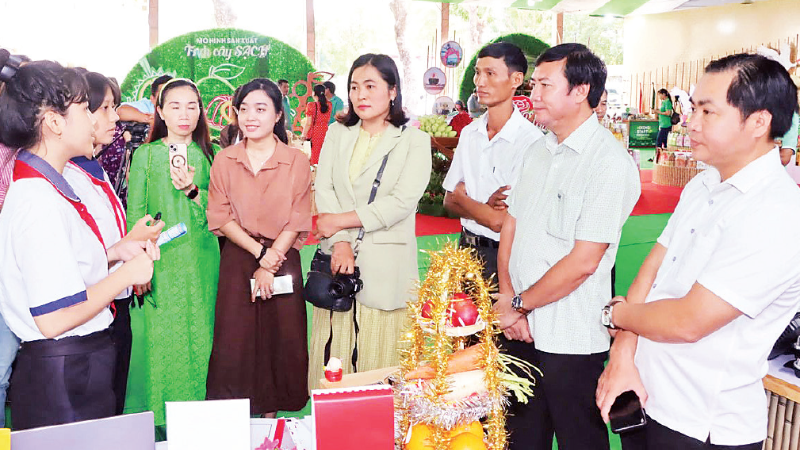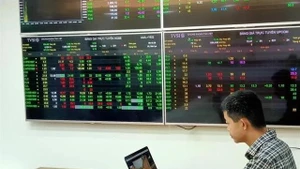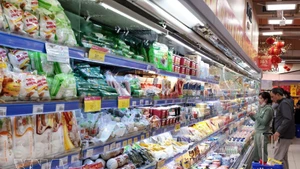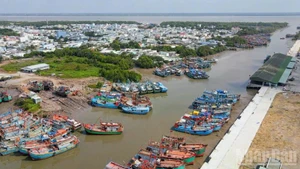Many new and innovative business models have emerged, generating stable incomes for individuals and families while spreading the entrepreneurial spirit and creativity, fuelling socio-economic growth and contributing to the building of a prosperous and happy nation.
Inspiring young generations
Dong Thap Province has long been known for its strength in agricultural production. Capitalising on this advantage, many young locals have successfully started their own businesses.
Nguyen Phuong Hang, born in 1992 and residing in Tan Khanh Commune, is the owner of the HF tissue-cultured seedling facility. After graduating with a degree in biotechnology and working for several companies, Hang decided to return to her hometown to start a business producing and supplying seedlings using tissue culture methods. At that time, the model was still relatively unfamiliar, but after convincing her family and receiving strong support from local authorities, she embarked on her new entrepreneurial journey.
After overcoming the initial challenges, the HF tissue-cultured seedling facility now receives large orders from customers across the country, producing hundreds of thousands of tissue-cultured banana plants annually. In 2021, her start-up project won Third Prize at the Mekong Delta Start-up Competition.
Another young entrepreneur, Van Huu Tai, born in 1997 and living in Tan Nhon Hamlet, Tan Hanh Ward, Vinh Long Province, has become well-known for his creativity, determination, and bold investment. His circular economy model combining Spirulina farming with duckweed and black apple snail cultivation has generated an annual income of several hundred million VND.
Tai’s model has earned him numerous recognitions, including Second Prize at the Tran Dai Nghia Technical Innovation Contest (Vinh Long Province, 2020–2021), Outstanding Rural Industrial Product Certification (2021), and a Three-star OCOP Product Certification (2023) from Vinh Long Province. The project was also featured in Viet Nam’s Golden Book of Creativity 2023.
He shared that while in his third year studying Biology at the University of Natural Sciences, Ho Chi Minh City, he was introduced to Spirulina by his lecturers. Initially unfamiliar with the algae, he soon discovered its many health benefits and decided to study and cultivate pure Spirulina in natural conditions for his graduation thesis.
Hang and Tai are among the many young individuals in the Mekong Delta who have boldly embraced innovation and entrepreneurship, enriching the region’s start-up ecosystem. Their projects have received significant attention and support from local authorities, youth unions, and businesses.
Supporting start-up models and ideas has always been a priority. The Youth Union regularly connects start-ups with businesses, promotes products on digital platforms, and coordinates with relevant departments to facilitate legal procedures for certification. Thanks to such efforts, the youth start-up movement has spread widely, motivating many young people to persist on their entrepreneurial journey.
Deputy Secretary of Ca Mau Provincial Youth Union Tran Dang Khoa
According to Tran Dang Khoa, Deputy Secretary of Ca Mau Provincial Youth Union, supporting start-up models and ideas has always been a priority. The Youth Union regularly connects start-ups with businesses, promotes products on digital platforms, and coordinates with relevant departments to facilitate legal procedures for certification. Thanks to such efforts, the youth start-up movement has spread widely, motivating many young people to persist on their entrepreneurial journey.
In 2024, Youth Union branches across Ca Mau implemented numerous programmes to support young entrepreneurs, such as revolving capital funds, start-up funds, and mutual aid schemes. Many start-up models have proven suitable for the province’s natural conditions, effectively utilising local resources, creating jobs, and offering new directions for household economies.
In Can Tho, the city has introduced a plan to develop a start-up and innovation ecosystem, establishing over 20 support organisations, incubators, co-working spaces, and programmes connecting businesses, institutes, and universities. Looking ahead, Can Tho aims to build a centre for start-up innovation, strengthen management training for young people, expand international cooperation, and affirm its role as the “entrepreneurial hub” of the region.
However, according to several experts, the start-up movement among young people in the Mekong Delta still faces challenges. Many still approach entrepreneurship in a fragmented, short-term manner; some ideas are disconnected from actual market demand, lack uniqueness, and struggle to create sustainable value. Many projects also encounter difficulties accessing preferential loans, and some fail after only a short period.
The need for collective support
“Entrepreneurship is not merely about youthful passion — it’s also about accumulating experience, developing management skills, and acquiring knowledge in finance, branding, and market development. These are aspects many young entrepreneurs overlook when starting their ventures.
Moreover, the Mekong Delta’s start-up ecosystem remains incomplete. Incubators and support centres have yet to develop synchronously, while connections between businesses, investors, and academic institutions remain fragmented,” said Dang Xuan Yen, Vice President of the Can Tho Young Entrepreneurs Association.
To further strengthen and deepen the youth start-up movement, it is essential to focus on key priorities such as connecting resources — from funding and experts to businesses — identifying and replicating outstanding start-up models, and recognising successful young entrepreneurs as role models to inspire others.
According to Tran Tri Cuong, Secretary of Vinh Long Provincial Youth Union, addressing the current limitations and promoting youth economic development requires joint efforts from the State, businesses, social organisations, and the young entrepreneurs themselves. Relevant authorities should continue improving mechanisms and policies to facilitate access to preferential loans, strengthen start-up funds, and streamline administrative procedures.
It is also necessary to build a start-up ecosystem tailored to the Mekong Delta’s regional characteristics, fostering closer connections among scientists, investors, and young entrepreneurs. Universities, colleges, and vocational training centres should enhance programmes on management skills, innovation, and digital marketing, while providing practical competitions and platforms for young people to gain experience.
Local enterprises can also act as mentors and partners, supporting young start-ups and helping connect their products with the market — ensuring the spirit of innovation and entrepreneurship continues to thrive throughout the region.
















